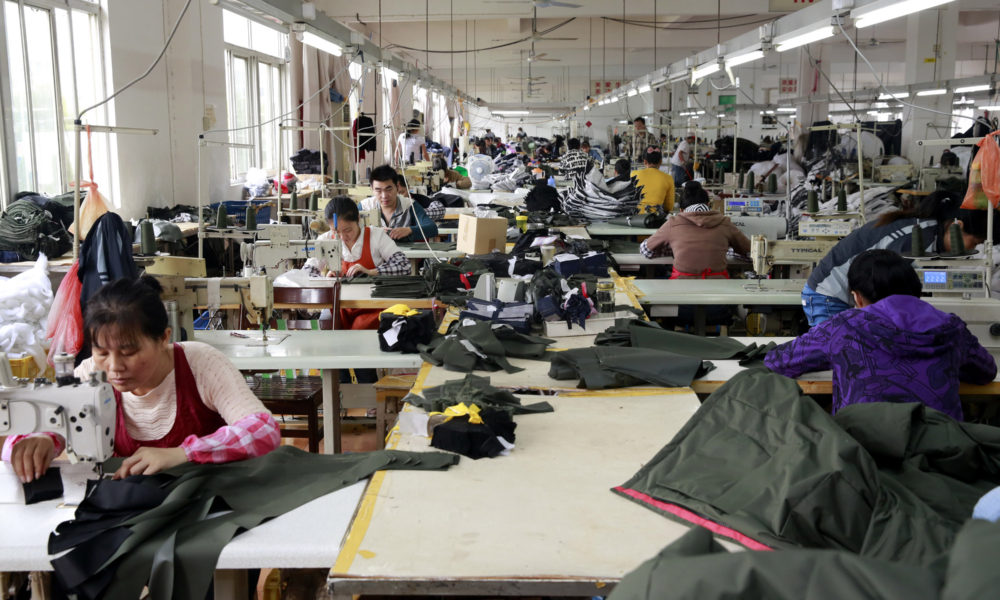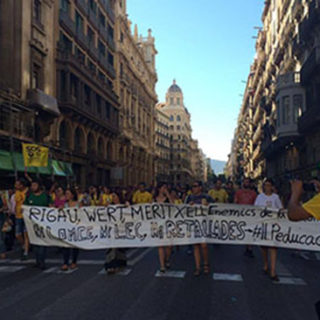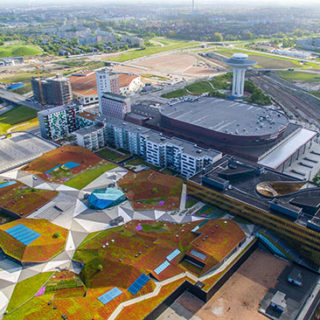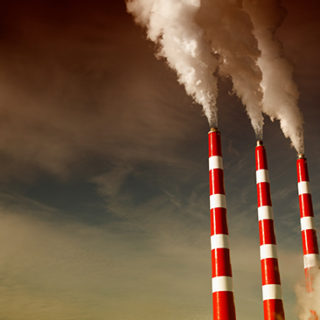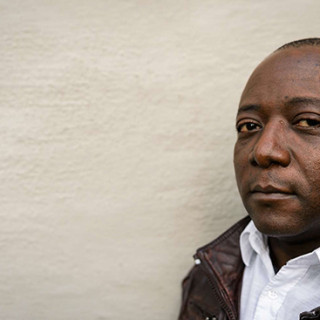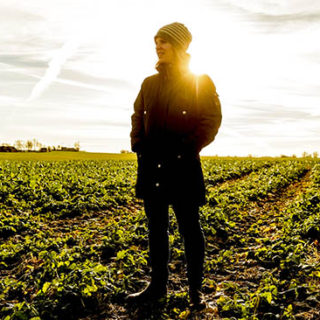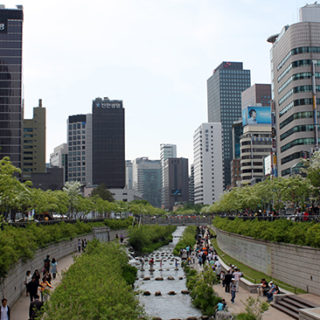Human rights, business and environment in focus at Raoul Wallenberg Institute
‟Swedish companies have done a lot of good work on the environment, but they are only beginning to address human rights abuses. For a long time they have not considered that issue to be of their concern and that it was the sole responsibility of states and governments. In this globalised world the companies need to address the whole range of human rights issues and responsibilities that you have as a corporation in relation to people and communities. I think the area of human rights and how it is linked to environment is going to be a really big area for us to work in the years to come”, says Malin Oud from the Raoul Wallenberg Institute.
The Raoul Wallenberg Institute of Human Rights and Humanitarian Law has been in Lund since the 80’s, focusing on research, education and institutional strengthening related to human rights in the global south. It is affiliated with Lund University and has offices in several parts of the world, such as China, Indonesia, Cambodia, Kenya, Jordan and Turkey.
Since last year they have begun to build up an office in Stockholm as well as expanding their work on business and human rights. Malin Oud is head of the Stockholm office and one of two team leaders for the area of economic globalisation and human rights. The other team leader is associate professor Radu Mares at the Lund office.
“We can support companies in addressing the whole range of human rights issues.”
Malin Oud has previously been head of the Institute’s China office in Beijing for many years as well as a consultant on business and human rights, and she reflects on her new position in Stockholm:
‟Traditionally we have not been very visible here in Sweden and have mainly worked on human rights in other countries, in ‘faraway’ places. In our new organisation we are focusing on four thematic issues to address globally, and one of these is economic globalisation and human rights. We want to link academic research and practice much more closely, and involve the corporate sector more in our work also here in Sweden”, says Malin Oud, and continues:
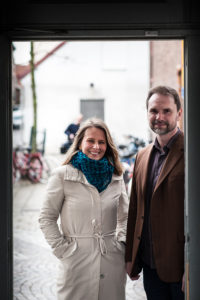
Malin Oud and Radu Mares at The Raoul Wallenberg Institute of Human Rights and Humanitarian Law
‟We can support companies in addressing the whole range of human rights issues, and also helping them understand what is the responsibility of the state and what is the responsibility of companies. One of the big opportunities for the future as I see it is to involve corporations in trying to find solutions in the area of human rights. Today some companies are as powerful in terms of their impact on human rights as some countries.”
Complex global value chains for products
Radu Mares, who has also worked with these issues for many years, points out that globalisation has changed the conditions immensely in the area of human rights the last twenty years.
‟Getting consensus on global treaties on human rights issues is so much more difficult nowadays. We still do not have a treaty on the human rights responsibilities of business actors. The global economy has become highly integrated and there are complexities that create enormous challenges for both companies and national authorities. How do you regulate corporate conduct when production and distribution is crossing so many jurisdictions and when so many different organisations are involved?” says Radu Mares.
Radu Mares describes the global value chains of goods nowadays as a very fragmented and diffused way of producing goods as opposed to twenty or thirty years ago:
‟A product can for example be designed in Sweden, assembled in China with components made in Indonesia and Malaysia and the raw materials coming for Congo or Uzbekistan. And then they are sold in a hundred markets all over the world. So many states and companies are involved so how are you going to regulate and create safeguards for human rights and the environment in these global value chains?”
Strengthening national legal systems of developing countries where many of these business abuses persist is both necessary and possible, but it will take time. States could and should collaborate more to devise some kind of common international regulatory framework for responsible business conduct. What home states – including the EU states – consider more and more these days are complex regulatory packages to assist and push their multinational enterprises to change? There is a clear need for innovation in regulation and new governance arrangements.
‟The EU and the UN talk about the need for a ‘smart mix’ of regulations and policies, like transparency laws requiring businesses to write reports on their impacts and efforts to correct them, and public procurement where states use their economic weight to demand responsible practices. These still leave a lot of flexibility to companies, which need to innovate and find their own ways to clean their act to reassure their investors and consumers. In this way states hope to find ways to tackle specific issues like child labor, conflict minerals etcetera. There are dozens of issues like that bringing disrepute to global value chains and economic globalisation as a whole”, says Radu Mares.
Building bridges between different sectors in the society
One of the things that Radu Mares has focused on in his research is human rights due diligence which is a way for companies to work systematically with CSR, corporate social responsibility, and to identify and manage their impacts on human rights throughout their value chains. States and the law can play an important role to make such due diligence the rule in the global economy.
‟We try to help legal community, policymakers and business with a more coherent but simple way to think about regulations in this global supply chain context to change business behaviour”, says Radu Mares.
The Raoul Wallenberg Institute has for many years functioned as a neutral platform for human rights.
‟Leading companies and non-governmental organisations have realised that they cannot work with human rights issues alone anymore. You need partnerships and to pool resources to make significant progress. As a company you have a choice. Either to catch this development and shape the new way of governance in human rights, or choosing status quo and only maximise profit in short term”, says Radu Mares, and explains further:
‟Nowadays we have new actors and new centers of power. The world has changed and the global economy has changed. The legal landscape is slowly changing too. More and more companies and law firms understand that CSR is not about philanthropy. Merely respecting weak local laws where you operate is not sufficient anymore in an integrated global economy.”
The Raoul Wallenberg Institute also works to support national human rights institutions in many countries.
‟They have a deep awareness of corporate impacts on workers, local communities and the environment. What they often lack is the connection to the international debate about corporate responsibilities and new international developments in different areas of law. We support them with insights into how the international debate is progressing and what new tools are appearing”, says Radu Mares.
Malin Oud adds that the Raoul Wallenberg Institute has worked in 60 countries and has experience from working to advance human rights in really complex contexts:
‟In most countries, different government departments and academic disciplines tend to work in silos. As an external actor, we can function as a neutral platform and invite different stakeholders to come together and discuss issues and try to find ways to address them. This role is often difficult for local actors to play themselves”, says Malin Oud.
Equally important in the work of the Raoul Wallenberg Institute is to build the capacity among local academics to play that role.
‟We have for example helped scholars in Asia to develop university courses on business and human rights”, says Malin Oud.
In the light of the new UN global goals for sustainable development, the so called SDGs, there is a need to focus more on human rights in the business sector. Without the engagement of the private sector it will be impossible to achieve the global goals of Agenda 2030.
‟The global goal number 17 is all about global partnerships between public and private sector. The UN came to the realisation that if you want to meet all these commitments, states cannot do this alone. You need the private sector. Not only for the money, but for the innovations, the creativity, the networks. That´s essential and there is no other way around, as expressly indicated in the SDGs”, says Radu Mares and continues:
‟I think there are reasons to be optimistic in a way. This new global framework is redefining the way we think about human rights. Its simplicity is useful with 17 goals 169 targets and 229 indicators which are timebound. It makes it much easier for civil society, for governments and international organisations to measure progress. For lawyers who are used to human rights treaties as the only way to promote rights and social justice, the SDGs are a different and rather new way to drive systemic change in the world.”
Malin Oud points out the importance of building bridges between universities, states, organisations and companies when it comes to implementing the SDGs in practice:
‟At the Raoul Wallenberg Institute, we want to contribute with the broad human rights perspective on the SDGs. There is already a concern that some actors – including some companies – are cherry picking among the SDGs, but none of the SDGs will be achieved unless they are addressed in an integrated way based on human rights. If you only choose your ‘favourite’ SDGs we are back at the very patchy old-school way of working with corporate social responsibility as a philanthropic project.”
It is also noticeable that there is no SDG on human rights.
‟It is said that human rights are the basis for all the other goals. However, we have also seen a dramatic global power shift during the past decade. China for example, which used to be the factory of the world, is now also the world’s largest economy and an emerging global super power. In order to address the human rights challenges of today, we have to involve new influential actors like corporations and emerging powers like China”, says Malin Oud.
She also raises the question of how to address other burning issues like climate change, water scarcity and toxic waste:
‟Important achievements with regard to poverty reduction Asia in the 1980s and 1990s are now being undermined by environmental pollution. Cancer deaths are soaring in China, and almost eighty percent of Chinas ground water is now so polluted that it is unsafe for human contact. Water scarcity is one of the biggest sustainability challenges for the world.”
There is an urgent need to address the linkages between human rights and the environment, and the Raoul Wallenberg Institute believes that the legal system and international human rights mechanisms can contribute to the work already being done in the environmental sphere.
‟We have recently started a collaboration with the UN Special Rapporteur on human rights and toxics, Mr. Baskut Tuncak, who will help us develop our work, not the least in Asia”, says Malin Oud.
Climate change is another major human rights challenge for the future, if not the biggest”, says Malin Oud:
‟Our affiliated professor Sumudu Atapattu has worked with human rights approaches to climate change for many years and has come out with a series of books on that subject”, says Malin Oud and concludes:
‟We aim to be a strong Swedish platform linking the environment and human rights. There is no other institution playing that role yet in Sweden, so that´s what we are planning to do.”
Text: Nina Nordh
Facts
-
Raoul Wallenberg Institute
-
The Raoul Wallenberg Institute is an organisation affiliated to Lund University. It was founded in 1984 and has its head office in Lund. The Raoul Wallenberg Institute is a network-based organization having worked in over 60 countries combining evidence-based human rights research with direct engagement with partners to contribute to a wider understanding of, and respect for, human rights and international humanitarian law.
The four main areas for the work of the Raoul Wallenberg Institute are:
- People on the Move
- Inclusive Societies
- Fair and Efficient Justice
- Economic Globalisation and Human Rights
Read more: http://rwi.lu.se/
-
Lund Human Rights Research Hub
-
The Lund Human Rights Research Hub (LHRRH) is a joint initiative between Lund University and the Raoul Wallenberg Institute (RWI). The hub serves to showcase the wide range of human rights research undertaken at Lund University/RWI and to stimulate increased collaboration and multi-disciplinary research and education.
Read more: http://www.humanrights.lu.se/


